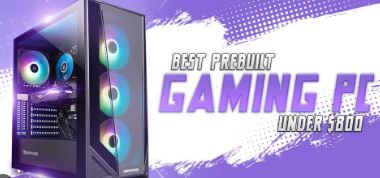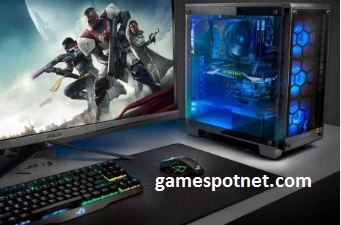Millions of individuals all around the world now enjoy gaming as a pastime. But for those who want to get into the hobby, the expense of Building the Best Gaming PC under $800 is sometimes a deterrent. This post will help you how can you construct a cheap gaming PC that can provide a top-notch gaming experience for less than $800.
Creating a cheap gaming setup PC is a fantastic way to start the hobby without spending a fortune. It will not only save you money, but it will also make you feel good knowing that you built a system that can play contemporary games at a respectable level of performance.Millions of individuals now enjoy gaming as a recreation.

Table of Contents
Key Components of a Gaming PC
This article’s goal is to give readers a step-by-step tutorial for constructing a gaming PC that can deliver a top-notch gaming experience for less than $800. We’ll go over all the essential components you should take into account while building a gaming PC, as well as how to pick the finest components given your budget.
- Understanding the Key Components of a Gaming PC
- Processor (CPU)
The processor, also known as the central processing unit (CPU), is one of the most important components of a gaming PC. It is responsible for processing data and running the instructions that make up a computer program. When it comes to gaming, you want to choose a CPU that is fast enough to keep up with demanding games.
- Graphics Card (GPU)
The graphics card, also known as the GPU, is the component that is responsible for rendering images and video on your computer. A good GPU will allow you to play games at higher resolutions and frame rates.
- Memory (RAM)
RAM, or random access memory, is the component that temporarily stores data as you work with it on your computer. When it comes to gaming, you want to have enough RAM to keep the game running smoothly without any lag.
- Storage (Hard Drive/SSD)
The storage component of a gaming PC is where you will store all your games, programs, and data. There are two main types of storage: hard drives and solid-state drives (SSDs). Hard drives are less expensive, but they are slower and have a lower capacity. SSDs are faster and have a higher capacity, but they are more expensive.
Motherboard
The motherboard is the component that connects all the other components of your PC. It is responsible for communicating between the different components and allowing them to work together. When choosing a motherboard, you want to consider the number of ports and slots available, as well as compatibility with the other components.
Power Supply Unit (PSU)
The power supply unit (PSU) is responsible for providing power to all the components of your PC. When choosing a PSU, you want to consider the power requirements of your components and choose a PSU that can deliver enough power to keep them running smoothly.
Other Optional Components
While the components listed above are the essential components for building a gaming PC, there are also several other components that you may want to consider, such as a sound card, a network card, or a wireless card. These components can enhance the overall gaming experience, but they are not essential for building a budget-friendly gaming PC.
Related posts
Choosing the Best Components for Your Build
Balancing Performance and Cost
When building a budget-friendly gaming PC, it is important to find the perfect balance between performance and cost. You want to choose components that will deliver the best possible gaming experience without breaking the bank.
Processor (CPU)
For this build, we recommend the AMD Ryzen 5 5600X. This processor offers excellent performance for its price, making it an excellent choice for budget-conscious gamers.
Graphics Card (GPU)
The NVIDIA GeForce GTX 1660 Super is an excellent choice for this build. It offers excellent performance for its price and will allow you to play most games at high settings.
Memory (RAM)
We recommend choosing 16GB of DDR4 memory for this build. This will give you enough memory to run most games without any lag.
Storage (Hard Drive/SSD)
For this build, we recommend choosing a 500GB SSD. This will give you plenty of storage space for your games and programs while also providing fast boot times and load times.
Motherboard
The ASRock B450M-HDV is a great choice for this budget-friendly gaming PC. It is compatible with the other components we have chosen and offers enough ports and slots to accommodate your needs.
Power Supply Unit (PSU)
The EVGA 600W 80+ Bronze Power Supply is a great choice for this build. It provides enough power to keep your components running smoothly and is also efficient, helping to keep your electricity bill low.
Other Optional Components
Depending on your needs, you may want to consider adding a sound card or a network card to enhance your gaming experience. However, these components are not essential for this build.
- Assembling the PC
- Tools You Will Need
Before you start assembling your PC, you will need a few tools, including a screwdriver, a pair of pliers, and a static wrist strap.
- Step by Step Guide
- Start by laying out all the components on a clean, flat surface.
- Install the CPU on the motherboard.
- Install the GPU in the PCIe slot on the motherboard.
- Install the RAM into the appropriate slots on the motherboard.
- Install the storage (SSD) into an available SATA port.
- Attach the power supply to the motherboard and the components that require power.
- Connect all the peripherals, such as the keyboard, mouse, and monitor.
- Turn on the PC and test to make sure everything is working as expected.
- Conclusion
- Recap
In this article, we have discussed how to build a budget-friendly gaming PC that can deliver a great gaming experience for under $800. We have covered all the key components that you need to consider when building a gaming PC and how to choose the best components for your budget
Final Thoughts
Building a gaming PC can be a fun and rewarding experience, especially when you are able to build one that is budget-friendly. With the components and information discussed in this article, you should now have a clear understanding of what it takes to build a great gaming PC for under $800.
Author Profile
-
Hi! I’m Kazim, and I LOVE games! I made gamespotnet to share cool stuff about video games with you. I stay up late playing games, finding secrets, and writing fun guides. Here, you’ll find:
Latest gaming and technology, Tips, Reviews ,News about new games !Fun facts about PC, console, phone etc. You can comment us .
Latest entries
 Apk for AndroidApril 19, 2025How to Earn $100 Daily with Cash Giraffe Mod APK
Apk for AndroidApril 19, 2025How to Earn $100 Daily with Cash Giraffe Mod APK Pc GamesApril 4, 2025Apex Legends – A Complete Beginner-Friendly Guide (With Advanced Tips, Download Steps & Pro Insights)
Pc GamesApril 4, 2025Apex Legends – A Complete Beginner-Friendly Guide (With Advanced Tips, Download Steps & Pro Insights) Pc GamesFebruary 16, 2025Sonic Delta: The Ultimate Fan-Made Sonic Experience
Pc GamesFebruary 16, 2025Sonic Delta: The Ultimate Fan-Made Sonic Experience Android GamesJanuary 30, 2025City Sniper Shooting 3D:Master Elite Missions & Dominate
Android GamesJanuary 30, 2025City Sniper Shooting 3D:Master Elite Missions & Dominate




